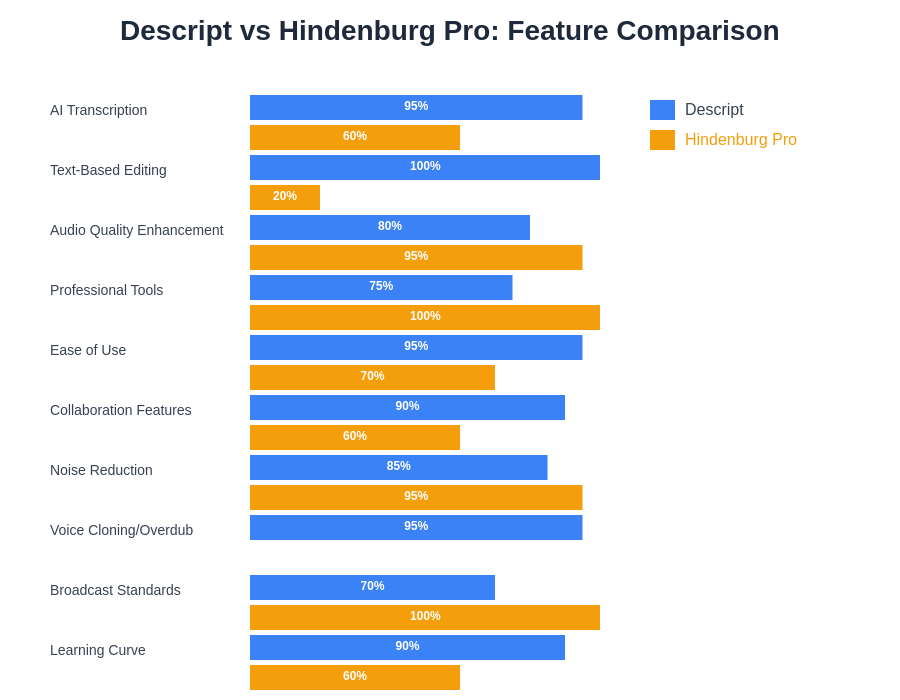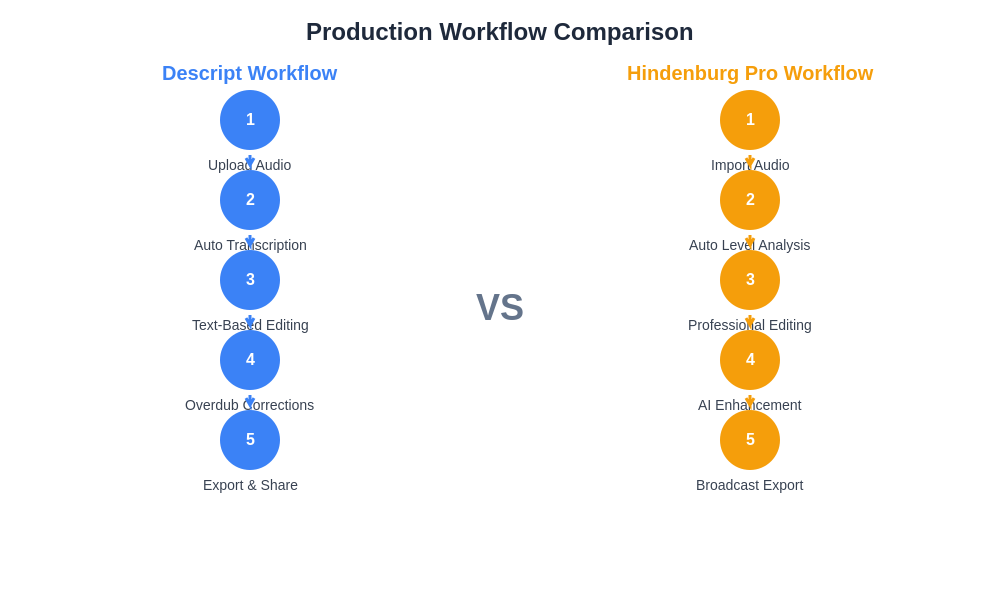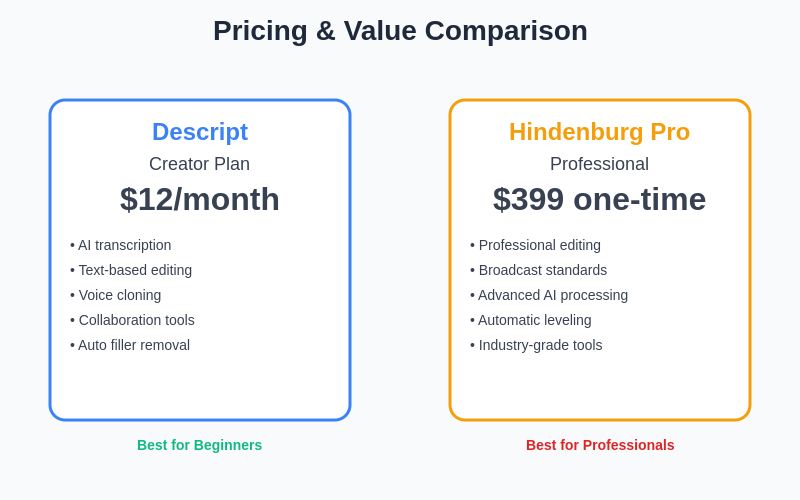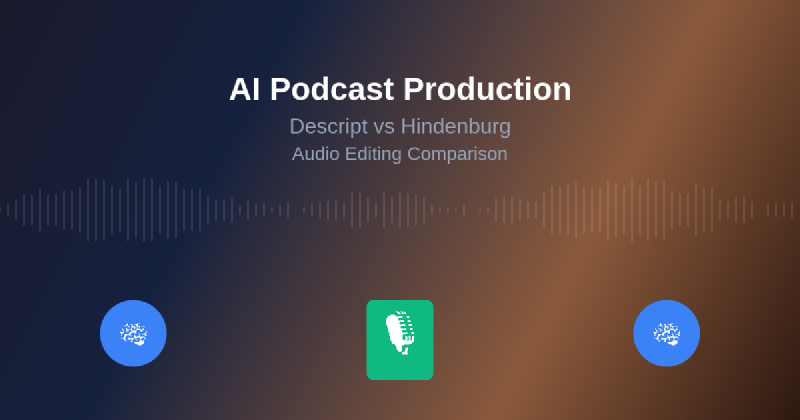The podcasting landscape has experienced a revolutionary transformation through the integration of artificial intelligence into audio production workflows, fundamentally changing how content creators approach recording, editing, and publishing their shows. Two platforms have emerged as industry leaders in this AI-driven evolution: Descript, with its groundbreaking text-based editing approach, and Hindenburg Pro, renowned for its professional-grade audio processing capabilities enhanced by intelligent automation. This comprehensive analysis explores how these platforms are reshaping podcast production through innovative AI technologies that streamline complex workflows while maintaining broadcast-quality standards.
Stay updated with the latest AI tools and trends as the podcasting industry continues to evolve with cutting-edge technologies that are making professional-quality content creation more accessible than ever before. The emergence of AI-powered audio editing represents a paradigm shift that empowers creators to focus more on content development and storytelling while allowing sophisticated algorithms to handle the technical complexities of audio production.
The Evolution of AI in Audio Production
The integration of artificial intelligence into podcast production represents a fundamental shift from traditional linear editing approaches to intelligent, context-aware systems that understand the nuances of human speech and audio content. Modern AI audio editing platforms leverage machine learning algorithms trained on vast datasets of professional audio content to automatically identify and correct common issues such as background noise, inconsistent levels, and speech artifacts that would traditionally require hours of manual adjustment by experienced audio engineers.
The sophistication of contemporary AI audio processing extends beyond simple noise reduction and level adjustment to encompass advanced features such as automatic speaker identification, intelligent silence removal, and even content-aware editing that can maintain natural conversation flow while removing unwanted segments. These capabilities have democratized high-quality podcast production by making professional-level audio editing accessible to creators regardless of their technical expertise or budget constraints.
The competitive landscape between Descript and Hindenburg Pro illustrates two distinct philosophical approaches to AI-enhanced audio production, each offering unique advantages that cater to different creator needs and production workflows. Understanding these differences is crucial for podcasters seeking to optimize their production efficiency while maintaining the highest possible audio quality standards.

The comprehensive feature analysis reveals distinct strengths in each platform, with Descript excelling in accessibility and text-based workflow innovations while Hindenburg Pro dominates in professional audio processing and broadcast-quality output capabilities.
Descript: Revolutionizing Text-Based Audio Editing
Descript has fundamentally reimagined the audio editing paradigm by treating audio files as editable text documents, utilizing advanced automatic speech recognition technology to create precise transcriptions that serve as the primary editing interface. This revolutionary approach allows creators to edit audio content by simply modifying the corresponding text, with changes automatically reflected in the audio timeline through sophisticated AI-powered algorithms that maintain natural speech patterns and timing.
The platform’s overdub feature represents one of the most impressive applications of AI voice synthesis technology in podcast production, enabling creators to generate synthetic speech that matches their natural voice characteristics for seamless correction of verbal mistakes or content updates. This capability eliminates the need for time-consuming re-recording sessions when minor corrections or additions are required, significantly streamlining the post-production workflow for regular podcast creators.
Experience advanced AI capabilities with Claude to enhance your content creation workflow with sophisticated language processing and creative assistance. The integration of multiple AI tools creates a comprehensive production environment where creators can leverage various specialized capabilities to produce professional-quality content efficiently.
Descript’s AI-powered features extend to intelligent filler word removal, automatic speaker labeling, and sophisticated noise reduction algorithms that analyze audio content contextually rather than applying blanket processing to entire recordings. The platform’s ability to distinguish between intentional pauses for dramatic effect and unwanted hesitations demonstrates the sophistication of its underlying machine learning models, which have been trained on extensive datasets of professional podcast content.
The collaborative features integrated into Descript’s AI framework enable multiple team members to work simultaneously on projects while maintaining version control and ensuring that AI-generated improvements are consistently applied across all editing sessions. This collaborative approach to AI-enhanced editing represents a significant advancement over traditional audio editing workflows that typically require sequential editing passes and complex project file management.
Hindenburg Pro: Professional AI Audio Enhancement
Hindenburg Pro approaches AI integration from the perspective of professional broadcast standards, incorporating intelligent audio processing algorithms that have been refined through decades of experience in radio and television production environments. The platform’s AI capabilities focus primarily on automatic level adjustment, intelligent noise reduction, and sophisticated audio restoration techniques that can salvage recordings made in challenging acoustic environments or with suboptimal equipment.
The automatic level feature in Hindenburg Pro represents a sophisticated implementation of AI-driven audio processing that analyzes speech patterns, background noise characteristics, and overall program dynamics to create consistent audio levels that meet broadcast standards without sacrificing the natural dynamics that give podcasts their engaging character. This intelligent processing goes far beyond simple compression or limiting, utilizing machine learning algorithms to understand the contextual importance of different audio elements within a podcast recording.
Hindenburg Pro’s noise reduction capabilities leverage advanced spectral analysis and machine learning algorithms to identify and remove unwanted audio artifacts while preserving the natural characteristics of human speech. The AI systems can distinguish between different types of background noise, from air conditioning hums to traffic sounds, applying targeted processing that eliminates distractions without introducing the artificial artifacts commonly associated with aggressive noise reduction processing.
The platform’s intelligent crossfading and editing assistance features demonstrate how AI can enhance professional audio editing workflows without replacing the creative decision-making that experienced audio engineers bring to podcast production. These tools suggest optimal edit points, automatically create smooth transitions between audio segments, and provide real-time feedback on audio quality metrics that help maintain consistent production standards across entire podcast series.
Comparative Analysis: Features and Capabilities
The fundamental difference between Descript and Hindenburg Pro lies in their approach to AI integration within the audio editing workflow. Descript prioritizes accessibility and speed through its text-based editing interface, making complex audio editing operations accessible to creators without extensive technical training, while Hindenburg Pro focuses on providing professional-grade AI tools that enhance traditional audio editing workflows without fundamentally changing the underlying production methodology.
Descript’s transcription accuracy represents a significant competitive advantage, with AI models that can handle multiple speakers, accents, and recording conditions while maintaining high accuracy rates that minimize the time required for transcript correction. The platform’s ability to automatically identify speakers and create properly formatted transcripts that can be directly used for show notes, blog posts, and accessibility compliance demonstrates the comprehensive nature of its AI implementation.
Hindenburg Pro’s strength lies in its sophisticated audio processing algorithms that can dramatically improve the quality of suboptimal recordings through intelligent noise reduction, automatic equalization, and dynamic range optimization that maintains the natural characteristics of human speech while eliminating technical deficiencies. The platform’s AI capabilities are particularly valuable for creators who record in challenging environments or use consumer-grade equipment but still require professional-quality output.
Enhance your research and content development with Perplexity to access comprehensive information and insights that can improve your podcast content quality and production efficiency. The integration of AI-powered research tools with audio production platforms creates opportunities for more informed and engaging podcast content.
The learning curve associated with each platform reflects their different philosophical approaches to AI integration. Descript’s intuitive text-based interface can be mastered relatively quickly by creators familiar with word processing applications, while Hindenburg Pro requires more time to fully utilize its professional-grade features but offers greater control over the final audio output for creators who prioritize maximum quality and customization.

The workflow methodologies employed by each platform demonstrate fundamentally different approaches to podcast production, with Descript emphasizing speed and accessibility through automated transcription and text-based editing, while Hindenburg Pro focuses on traditional professional audio editing enhanced by sophisticated AI processing capabilities.
Workflow Integration and Production Efficiency
The integration of AI capabilities into existing podcast production workflows varies significantly between Descript and Hindenburg Pro, with each platform offering distinct advantages depending on the creator’s production methodology and quality requirements. Descript excels in scenarios where rapid content creation and iteration are prioritized, enabling creators to quickly produce polished episodes through automated processing and intuitive text-based editing that eliminates many traditional bottlenecks in the post-production process.
Hindenburg Pro’s workflow integration focuses on enhancing traditional audio editing methodologies rather than replacing them, providing AI-powered tools that accelerate specific aspects of the production process while maintaining the creative control that professional producers require. The platform’s ability to automatically analyze recording quality and suggest appropriate processing chains demonstrates how AI can augment human expertise rather than replacing professional judgment in critical creative decisions.
The batch processing capabilities available in both platforms showcase different approaches to handling multiple audio files and episodes within a podcast series. Descript’s AI can apply consistent processing across entire seasons of content, automatically maintaining speaker identification, noise reduction settings, and transcription formatting that ensures consistency across large content libraries. Hindenburg Pro’s batch processing focuses on applying professional-grade audio enhancement algorithms that can dramatically improve the technical quality of multiple recordings while preserving the unique characteristics that define each episode’s sonic signature.
AI-Powered Content Enhancement Features
The content enhancement capabilities provided by AI integration extend far beyond traditional audio editing functions, encompassing features that can fundamentally improve the listener experience and content accessibility. Descript’s automatic chapter generation uses natural language processing algorithms to identify topic transitions and create meaningful segment divisions that enhance navigation and improve the overall listening experience for audiences consuming content on modern podcast platforms.
The automatic show note generation feature available in Descript demonstrates how AI can extend the value of podcast production beyond the audio content itself, creating comprehensive written summaries, extracting key quotes, and identifying important topics discussed throughout episodes. This capability significantly reduces the time required for content marketing and SEO optimization while ensuring that podcast episodes are properly indexed and discoverable through search engines and podcast directories.
Hindenburg Pro’s content enhancement focus centers on audio quality improvements that can transform amateur recordings into professional-sounding productions through intelligent processing algorithms that understand the characteristics of human speech and can automatically apply appropriate enhancement techniques. The platform’s ability to automatically detect and correct common recording issues such as plosives, sibilance, and room resonance demonstrates the sophistication of modern AI audio processing capabilities.
Cost-Effectiveness and Value Proposition
The economic considerations surrounding AI-powered podcast production tools involve evaluating not only the direct subscription costs but also the time savings and quality improvements that these platforms provide compared to traditional editing approaches. Descript’s pricing model reflects its positioning as an accessible platform for content creators of all levels, offering comprehensive AI capabilities at price points that make professional-quality production tools available to independent creators and small production teams.
Hindenburg Pro’s pricing structure reflects its professional orientation, with costs that are justified by the sophisticated audio processing capabilities and broadcast-quality output that the platform delivers. The return on investment for professional podcast producers often comes through reduced editing time and improved audio quality that can enhance audience retention and advertiser appeal, making the platform’s pricing competitive within the professional audio production market.
The hidden costs associated with each platform include learning time, additional software requirements, and potential workflow changes that may impact overall production efficiency. Descript’s integrated approach minimizes additional software requirements while Hindenburg Pro may require complementary tools for certain production tasks, affecting the total cost of ownership for different types of podcast production workflows.

The pricing structures of both platforms reflect their target audiences and feature sets, with Descript offering subscription-based accessibility for regular content creators while Hindenburg Pro provides professional-grade capabilities through a one-time investment that appeals to established production studios and serious podcasters.
Technical Performance and Reliability
The technical performance characteristics of AI-powered audio editing platforms directly impact production workflows and final output quality, making reliability and processing speed critical factors in platform selection. Descript’s cloud-based processing architecture enables sophisticated AI operations to be performed on less powerful local hardware while ensuring that transcription and audio processing tasks are completed efficiently regardless of the creator’s technical infrastructure.
Hindenburg Pro’s local processing approach provides greater control over processing resources and ensures that sensitive audio content remains secure within the creator’s own computing environment. The platform’s optimized algorithms can deliver professional-quality results even on modest hardware configurations, making it accessible to creators who prefer local processing or have specific security requirements for their content.
The accuracy and consistency of AI processing results vary between platforms depending on the specific algorithms employed and the training data used to develop the underlying machine learning models. Descript’s transcription accuracy benefits from continuous improvement through user feedback and extensive training on diverse audio content, while Hindenburg Pro’s audio enhancement algorithms draw on decades of professional audio engineering experience to deliver predictable and reliable results.
Future Developments and Industry Trends
The continued evolution of AI technology in podcast production promises even more sophisticated capabilities that will further streamline production workflows while maintaining or improving output quality. Both Descript and Hindenburg Pro are actively developing enhanced AI features that will address current limitations and expand the creative possibilities available to podcast creators of all skill levels.
The integration of AI-powered content analysis capabilities that can provide feedback on engagement potential, topic coverage, and audience appeal represents an emerging trend that could fundamentally change how podcast content is conceived and produced. These analytical capabilities could help creators optimize their content for maximum impact while maintaining their authentic voice and creative vision.
The democratization of professional-quality podcast production through AI assistance is likely to continue expanding the podcasting ecosystem by enabling more creators to produce high-quality content without extensive technical expertise or significant equipment investments. This trend could lead to increased competition within the podcasting space while also creating new opportunities for niche content and specialized audiences.
Advanced AI capabilities such as real-time processing, predictive editing suggestions, and automated content optimization are likely to become standard features in professional podcast production platforms, further reducing the barriers between creative vision and final production quality. The continued refinement of these technologies will enable creators to focus more on content development and audience engagement while relying on AI systems to handle the technical complexities of modern podcast production.
Conclusion and Recommendations
The choice between Descript and Hindenburg Pro for AI-powered podcast production ultimately depends on the creator’s priorities, technical expertise, and production requirements. Descript excels for creators who prioritize ease of use, rapid content creation, and integrated transcription capabilities, while Hindenburg Pro serves creators who require professional-grade audio processing and prefer traditional editing methodologies enhanced by intelligent automation.
The future of podcast production lies in the continued integration of AI capabilities that enhance human creativity rather than replacing it, enabling creators to produce higher-quality content more efficiently while maintaining the authentic voice and creative vision that defines successful podcasting. Both platforms represent significant steps forward in this evolution, offering different paths toward the same goal of democratizing professional-quality podcast production.
Disclaimer
This article is for informational purposes only and does not constitute professional advice. The features and capabilities of audio editing software are subject to change, and users should evaluate current offerings and pricing before making purchasing decisions. The effectiveness of AI-powered features may vary depending on specific use cases, recording quality, and user expertise. Always consider your specific production requirements and budget when selecting podcast production tools.
